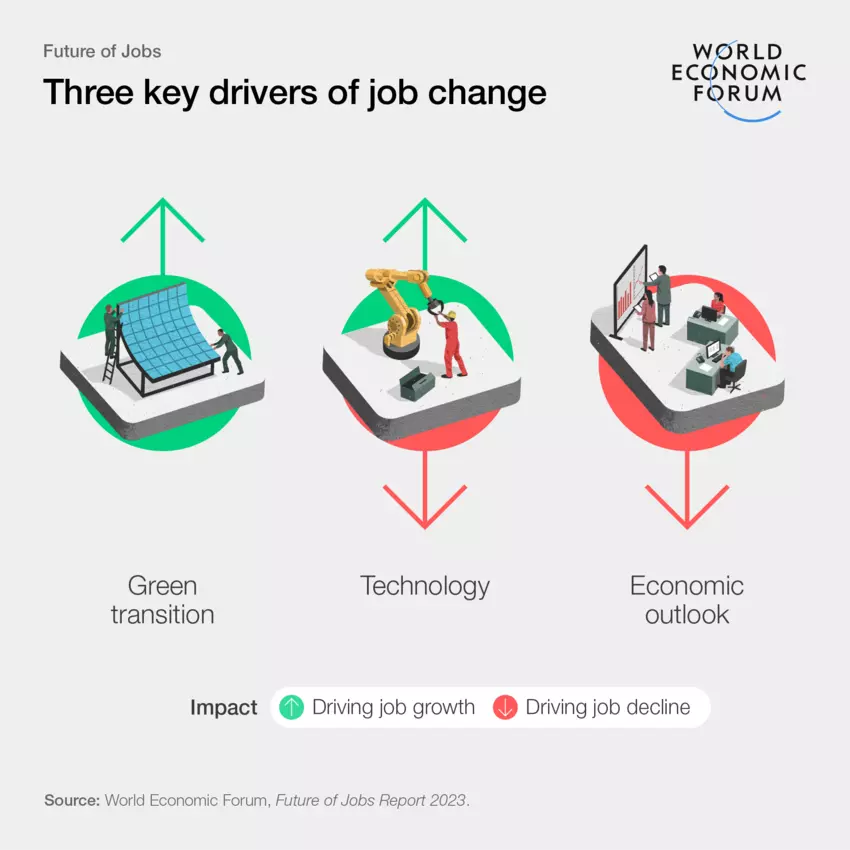Artificial Intelligence and other economic drivers will result in 83 million job losses over the next five years, amid “structural labour market churn” according to the World Economic Forum’s new Future of Jobs report.
The shift means that 44% of workers’ skills will be disrupted in the next five years, WEF says starkly, suggesting in the 296-page report that “generative AI models are likely to continue shaping sectoral shifts in employment.”
On skills, despite rise of “intelligent” tools powered by AI, the need for analytical skills was rated by the CIOs and other business contributors to the report as growing most quickly; “reflecting the increasing importance of complex problem-solving in the workplace.” This was followed by creative thinking and tech literacy.
The report comes weeks after analysts at Goldman Sachs said that "a new wave of AI systems [and] shifts in workflows triggered by these advances could expose the equivalent of 300 million full-time jobs to automation."

AI Job Losses/disruption to drive huge labour market shifts
Automation and other shifts across agriculture technologies, digital platforms “are all expected to result in significant labour-market disruption” WEF said, suggesting of prospective AI job losses that the “fastest-declining roles relative to their size today are driven by technology and digitalization.”
The fastest declining roles are clerical or secretarial roles the report says; traditional back-office roles that the rise of AI means are rapidly being automated. An example this week is at IBM, where CEO Arvind Krishna told reporters that of his 26,000 staff working in back-office functions “I could easily see 30% of that getting replaced by AI and automation over a five-year period.” (IBM cut approximately 5,000 roles this year, but 7,000 new roles in Q1.)

Don't miss out: Follow The Stack on LinkedIn
This broader labour market shift will also create 69 million jobs (for net losses of 14 million jobs) with AI and sustainability to grow fastest, and eight of the 10 top areas having a technology component, WEF said.
“Data analytics, climate change and environmental management technologies, and encryption and cybersecurity are expected to be the biggest drivers of job growth” the 2023 Future of Jobs report said on May 1.
Yet automation expectations have underperformed

“For people around the world, the past three years have been filled with upheaval and uncertainty for their lives and livelihoods, with COVID-19, geopolitical and economic shifts, and the rapid advancement of AI and other technologies now risks adding more uncertainty,” said Saadia Zahidi, Managing Director, WEF.
“The good news is that there is a clear way forward to ensure resilience. Governments and businesses must invest in supporting the shift to the jobs of the future through the education, reskilling and social support structures that can ensure individuals are at the heart of the future of work,” Zahidi added.
A word of caution on the predictions: The Future of Jobs Report 2023 also suggests that tasks are seen as no more automated now than they were three years ago when the report was last published. About a third of tasks (34%) are currently automated, just 1% above the 2020 figure. Surveyed companies also revised down their expectations for further automation, to 42% of tasks by 2027, compared to 2020 estimates of 47% of tasks by 2025.
This year’s report brings together the perspectives of 803 companies – collectively employing more than 11.3 million workers – across 27 industry clusters and 45 economies from all world regions.









